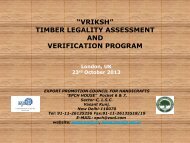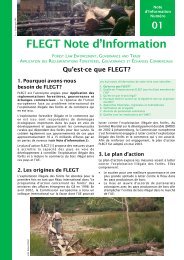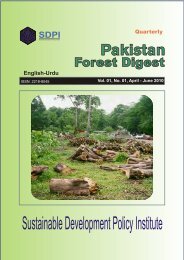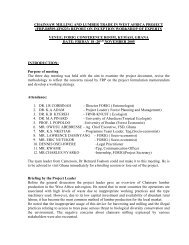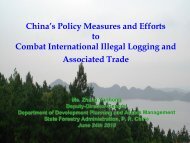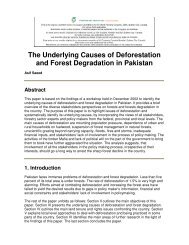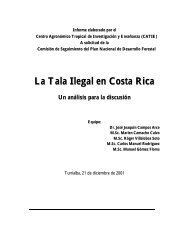CHAINSAW MILLING IN GHANA: CONTExT, DRIVERS ... - Fornis.net
CHAINSAW MILLING IN GHANA: CONTExT, DRIVERS ... - Fornis.net
CHAINSAW MILLING IN GHANA: CONTExT, DRIVERS ... - Fornis.net
- No tags were found...
Create successful ePaper yourself
Turn your PDF publications into a flip-book with our unique Google optimized e-Paper software.
Chapter 6. Conclusions and policy recommendations6.2.7 Operators’ perspectives on regularised forms of chainsaw millingIn terms of the ways in which chainsaw activities should be regularised, at least 70%of operators want concessions to be given for registered groups of operators, 18%want individual permits and 6% want small concessions for individuals. Most operatorswere in favour of any system that dealt with organised groups (Acheampongand Marfo 2009).The information presented in Table 17 shows that chainsaw operators are willing topay for trees under a regularised regime in some way, and that the price they arewilling to pay for high quality trees compares favourably to current stumpage fees.6.2.8 Multi-stakeholder dialogueA process is needed to review the ban of CSM and design innovative policy optionsto address the issue of supplying the domestic timber market with legal timber.Stakeholders need to be engaged in this process as soon as possible. A multistakeholderdialogue approach is crucial; the drivers for CSM cut across social, political,environmental and economic realms and involve a range of interests.Several factors must be considered when beginning discussions to design innovativepolicy options:• Dealing with sector corruption, particularly within the FSD district-level staffand the police, is a fundamental requirement.• Policy discussions need to be approached with an open mind, because of thegeneral social acceptance of CSM, and because most stakeholders are in favourof regulating the activity rather than maintaining a ban that cannot beenforced.• In order to be effective, policies must have the participation of key stakeholders,including legal and illegal loggers.• It is vitally important to deal with local elite interests.• The applicable laws on CSM must remove the ambiguities often encounteredby practitioners. It may be useful to subject these interpretations to furtherpublic and stakeholder discussion.• The procedure manuals for harvesting timber need to be revised to accommodatea range of methods for obtaining and processing timber for domestic use.• Research should continue to be an important part of policy discussions. Stakeholdersneed relevant information when considering options and impacts.6.3 The way forwardIn spite of the fact that chainsaw milling has been banned for more than ten years inGhana, the practice continues and is highly accepted by the general public. Freehandchainsaw milling is perceived to be very wasteful, and also very difficult tocontrol. For any policy option to be effective, it should aim to optimise the advantagesof chainsaw milling while at the same time reducing any adverse effects of thepractice. The policy should also address the drivers that give rise to the perpetuation51



